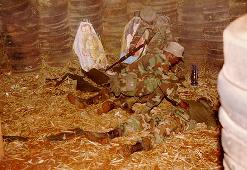| OVERVIEW – Training | ||||||||||||||||||
| Back to Overview | ||||||||||||||||||
Every military organisation, if it is to remain a viable, relevant and useful pillar on which the society it supports is built, must train its human resource element constantly. The human resource element is one of the most important facets of this organisation and it is by training that these individuals will be able to professionally manage the numerous and widely varied military duties they carry out. It has been said of an army and its personnel "train hard, fight easy". Despite financial constraints and shrinking budgets over the years the Force has continued to maintain a credible record with respect to training. The JDF currently conducts over 40 different courses, which
can be broken down into four main categories. – Overseas courses – Exercises and military exchange programmes – Local Courses – Unit and sub unit training. Overseas courses are conducted primarily in three countries: the United States, Canada, and the United Kingdom. The JDF has been able to grasp these opportunities for overseas training mainly as a result of foreign training assistance programs. Approximately 40 officers receive overseas training annually with the majority undergoing basic officer courses and subsequently going on to intermediate and advanced courses in their various fields of endeavour be it infantry, aviation, marine, or the engineers. The training value gained from these exposures is highly appreciated and well worth the effort. Our officers, soldiers, sailors and airmen are exposed to modern military weaponry, equipment, and technology and graduate from these courses prepared to apply their newly honed skills to the JDF.
Courses in the United States are conducted at:
– Search and Rescue Planning Course and the International Maritime Officers Course at US Coast Guard Rescue Training Centre at York Town, Virginia. – Ranger Course at Fort Benning, Georgia. – Basic and salvage diving courses at Naval Coastal Systems Centre, Panama City, Florida. The JDF has found military courses (including the basis officers training) in the United Kingdom invaluable in assisting with maintaining its professional standards. The JDF has therefore consistently taken advantage of the following courses run by the British Armed Forces whenever vacancies are afforded: – Royal Army Staff College course conducted at Camberley. – Advance Infantry Officers course conducted at Warminster. – Officers signals course at the Royal School of Signals. – Military police officers course conducted at the Royal Military Police Training School. – Band Sergeant Majors’ course conducted at the Royal Military School of Music. – The Combat Engineer course conducted at the Royal School of Military Engineering.
Military skills garnered through periodic exercises and military exchange programmes remain a valuable asset to the individual and in turn is highly beneficial to the JDF. Exercise and exchange programmes currently being conducted are as follows. EXERCISE ‘RED STRIPE/CALYPSO HOP’ Once called Exercise Trim Craft/Pike Staff this four weeks exercise normally held annually in May is the largest of the exercises/ exchange training programmes in the JDF, conducted between the British Army and the Jamaica Defence Force. This exercise has been conducted since the since the 60s. The exchange involves some 140 all ranks from both military forces and aims to involve as many units in the JDF as possible. Recently, the Exercise has been extended to the Third Battalion Jamaica Regiment (National Reserve) and other Defence Forces throughout the Caribbean. Exercise ‘Calypso Hop’ is the name given to the JDF contingent overseas and Exercise ‘Red Stripe’ is the name given to the British contingent in Jamaica.
This exercise is held throughout March and April annually and involves some 170 – 200 members of Bermuda Regiment coming to Jamaica on their annual camp. The exercise involves training in jungle warfare with attachments to the JDF Coast Guard, Provost Unit, Engineer Regiment and the Jamaica Military Band. Bermuda Regiment troops have been coming to Jamaica on exercise since 1967. Exercise Trade Winds is held in various Caribbean islands
annually during the month of March and has been a part of the JDF diary of events since
1987. The exercise incorporates a platoon from one of the JDF’s regular infantry
battalions and troops from the Caribbean region. This exercise incorporates training in
jungle warfare, watermanship, and airborne operations.
The Royal Marines have made use of the lush green tropical
rain forests of Portland to conduct jungle warfare and adventure training. Held throughout
the month of May and June this exercise sees the participation of as many as 320 all ranks
to include Combat and Structural Engineers engaging in local community projects for the
duration of the exercise. Exercise ‘Steel Drum’ has been on the JDF dairy of
events since 1991. This exercise is held in November and has, since 1992, involved a platoon (32 men) size contingent from one of the infantry battalions going to the island of Martinique for commando type training. Commando training involves skills in unarmed combat, watermanship skills, endurance and confidence building. Over the years, as avenues for academic qualification become more readily accessible, the JDF has sought to capitalize on a number of valuable courses offered by various academic institutions in Jamaica. A variety of diploma and degree courses are currently being offered at these institutions. Civilians academic institutions include:- -The Vocational Training and Development Institute. -The Jamaica Maritime Institute. -The Institute of Management and Production -The University of Technology (UTECH) -The University of the West Indies. Focusing on our own training resources, the JDF conducts a number of locally run courses and cadres: –Jamaica Junior Command and Staff Course. -Jamaica Senior Leaders Course -Senior Non-Commissioned Officers’ Course -Junior Non-Commissioned Officer Course It is the responsibility of every unit commander to set
training objectives, prepare Our soldiers have to be ready to undertake a wide variety of
operations and duties, sometimes at short notice. This ability to adapt is due to the
constant high level of training and quality of our soldiers.
|
||||||||||||||||||
Copyright
© Jamaica Defence Force, all rights reserved. |
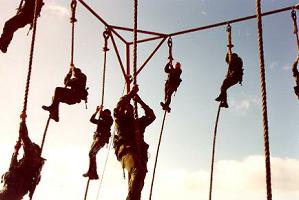
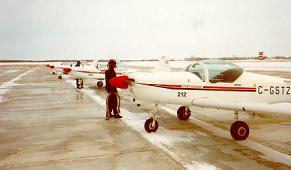
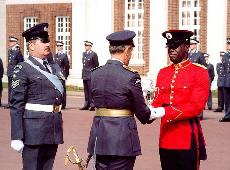
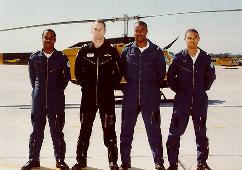 Military training conducted in Canada covers basic pilot and other aviation related
training. Junior and Senior Command and Staff Training is conducted at the Canadian Land
Forces Command and Staff College at Fort Frotenac, Kingston, Ontario.
Military training conducted in Canada covers basic pilot and other aviation related
training. Junior and Senior Command and Staff Training is conducted at the Canadian Land
Forces Command and Staff College at Fort Frotenac, Kingston, Ontario.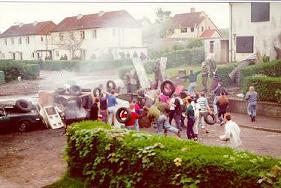
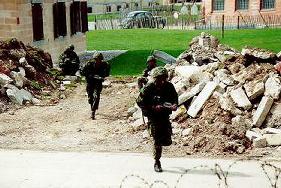
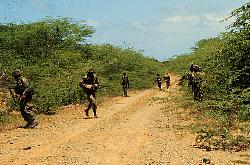 Exercise ‘PRANG’ is conducted from January to
February annually. The exercise involves the exchange of troops between the JDF and the
Puerto Rico Army Reserve National Guard (PRANG), troops from the Third Battalion Jamaica
Regiment (National Reserve) are in attendance with a few attachments from the Regular
Force. Training is usually conducted in jungle warfare.
Exercise ‘PRANG’ is conducted from January to
February annually. The exercise involves the exchange of troops between the JDF and the
Puerto Rico Army Reserve National Guard (PRANG), troops from the Third Battalion Jamaica
Regiment (National Reserve) are in attendance with a few attachments from the Regular
Force. Training is usually conducted in jungle warfare.